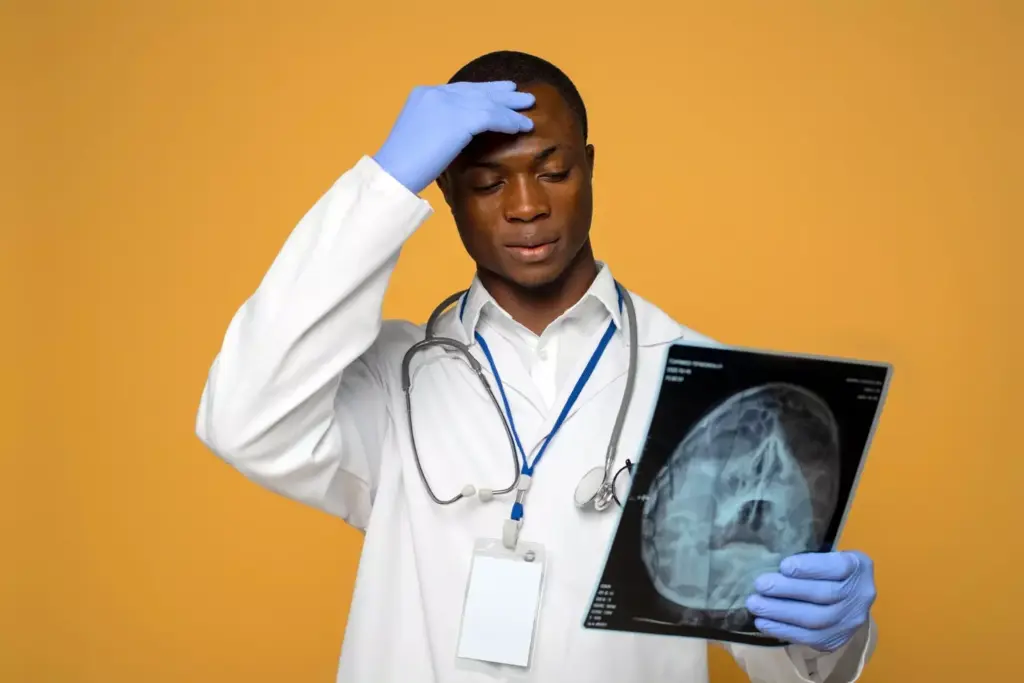
At Liv Hospital, we know how worrying memory lapses or sudden confusion can be. Studies show that up to one-third of people with a brain tumor face some memory or cognitive problems.
Research in Cureus shows a strong link between brain cancer and memory issues. We aim to offer top-notch healthcare, supporting patients from around the world.
We’re dedicated to helping you understand the complex tie between brain cancer and memory loss. We’ll give you key info to help you deal with this tough situation.
Key Takeaways
- Up to one-third of people with a brain tumor experience cognitive or memory difficulties.
- A significant connection exists between brain cancer and memory issues.
- Liv Hospital provides world-class healthcare with complete support for international patients.
- Understanding the link between brain cancer and memory loss is key for patients.
- We will explore the key facts you need to know about brain cancer and memory loss.
The Connection Between Brain Cancer and Memory Loss

It’s important to know how brain cancer affects memory. Both malignant and benign tumors can harm cognitive function. This leads to various memory-related problems.
People with brain cancer often worry about memory issues. Research shows that brain cancer patients face cognitive changes. These changes can affect their daily life and tasks.
Cognitive Changes in Brain Cancer Patients
Patients with brain tumors may experience short-term and long-term memory loss. The severity and type of memory problems vary. This depends on the tumor’s location, size, and type.
- Short-term memory loss: Trouble remembering recent events or learning new things.
- Long-term memory loss: Difficulty recalling past events or familiar information.
- Speech problems: Trouble finding the right words or following conversations.
- Confusion and disorientation: Feeling lost or having trouble understanding one’s surroundings.
The Science Behind Cognitive Changes
The science behind these changes is how brain tumors affect brain tissue. Tumors can press on nearby areas, disrupting brain function.
Key factors influencing cognitive changes include:
- Tumor location: Tumors in certain areas, like the temporal or frontal lobes, can have specific cognitive effects.
- Tumor size and growth rate: Larger or faster-growing tumors tend to cause more significant cognitive disruptions.
- Pressure on surrounding tissue: The pressure exerted by the tumor can affect how different parts of the brain communicate.
Understanding these factors helps healthcare providers manage cognitive effects in brain cancer patients.
Understanding Brain Tumors and Their Impact on Cognitive Function

Brain tumors, whether they are cancerous or not, can harm how we think and remember. We’ll look at how different tumors and where they are in the brain affect our thinking.
Malignant vs. Benign Tumors: Cognitive Effects
Malignant brain tumors grow fast and can badly hurt our thinking. They can make us forget recent things, mix up names, and struggle with tasks we know well.
Benign tumors don’t grow like cancer, but they can also hurt our thinking. How much they affect us depends on where they are, not how big they are.
| Tumor Type | Cognitive Effects |
|---|---|
| Malignant | Significant cognitive impairment, memory loss, language difficulties |
| Benign | Variable cognitive effects, often location-dependent |
How Tumor Location Affects Memory
Where a brain tumor is matters a lot for how it affects our thinking. Tumors near memory areas, like the temporal lobe, can really mess with our memory.
Temporal Lobe Tumors: These can mess up making new memories and getting old ones back. People might have trouble learning new stuff and remembering names and words.
Frontal Lobe Tumors: Tumors here can mess with planning, making decisions, and solving problems. This can make everyday tasks harder, which can affect memory too.
Studies show that the type and where a brain tumor is can really affect how we think. Knowing this is key to dealing with memory loss from brain tumors.
Key Memory Loss Symptoms Associated with Brain Tumors
Brain tumors can really mess with your memory, causing lots of cognitive problems. People with brain tumors often face memory-related symptoms that can really impact their daily life.
Short-Term Memory Difficulties
Short-term memory loss is a big symptom of brain tumors. It’s hard to remember recent things, like what you had for breakfast or appointments. It’s like your memory is a blank slate.
Examples of short-term memory difficulties include:
- Forgetting where everyday items are placed
- Struggling to remember new information or instructions
- Repeating questions or statements because they were forgotten
Language and Communication Problems
Brain tumors can also mess with your language and communication skills. Some people might find it hard to find the right words or follow conversations. It can be tough in social and work settings.
Symptoms may include:
- Struggling to find the appropriate words
- Using incorrect or nonsensical words
- Difficulty understanding complex sentences or instructions
Confusion and Disorientation Signs
Confusion and disorientation are common symptoms too. People might feel lost or disconnected from their surroundings. It can be really scary.
| Symptom | Description |
|---|---|
| Disorientation | Feeling lost or unsure of the current date or time |
| Confusion | Difficulty understanding the environment or situation |
| Mood Changes | Experiencing mood swings or emotional changes |
After surgery for a brain tumor, some people might have memory problems. These can get better over time but sometimes stick around. It’s important to know these symptoms to help those affected.
Which Types of Brain Tumors Are Most Likely to Cause Memory Loss?
Some brain tumors, like glioblastoma, can lead to memory loss. The tumor’s location and how aggressive it is affect its impact on thinking. We’ll look at which tumors cause memory loss, their characteristics, and how they affect the brain.
Glioblastoma and Cognitive Impairment
Glioblastoma is a fast-growing and deadly brain cancer that harms thinking, including memory. Research shows that glioblastoma patients often see a big drop in their thinking skills. This makes everyday life hard and affects their quality of life.
“The effects of glioblastoma on thinking can be very bad,” says a top neurosurgeon. This shows why it’s key to study how glioblastoma affects the brain.
Temporal Lobe Tumors and Memory Function
Tumors in the temporal lobe can mess with memory. This area is key for storing and processing memories. People with these tumors often struggle to make new memories and remember things they already know.
- Difficulty in forming new memories
- Problems with language and communication
- Challenges in recognizing familiar faces and places
Frontal Lobe Tumors and Executive Function
Frontal lobe tumors can hurt high-level thinking skills like planning and solving problems. Tumors in the frontal lobe can change how a person acts, feels, and thinks. This makes simple tasks hard.
As we’ve seen, different brain tumors affect thinking in different ways. Knowing this helps doctors create better treatment plans and support patients better.
Can Pituitary Tumors Affect Memory and Cognition?
Pituitary tumors can do more than just mess with hormones; they can also mess with memory and thinking. These tumors, which are often not cancerous, can really change a person’s life. They can affect how well someone thinks and remembers things.
Hormonal Imbalances and Cognitive Function
The pituitary gland is key in keeping hormone levels right in our bodies. Tumors here can mess up hormone production. This can lead to problems with thinking and memory.
Research shows that people with pituitary tumors often have thinking problems. For example, thyroid-stimulating hormone (TSH) issues can cause memory loss and trouble focusing.
Recognizing Cognitive Symptoms in Pituitary Disorders
It’s important to know the thinking problems linked to pituitary tumors early. This helps in getting the right treatment fast. Common thinking problems include:
- Memory loss or trouble remembering recent things
- Feeling confused and not knowing where you are
- Struggling with words and talking
- Having trouble with planning and making decisions
These issues can really affect a person’s daily life and happiness. Early treatment of pituitary tumors can help lessen these thinking problems. This can make a big difference in how well someone does.
If you’re experiencing these symptoms, it’s important to see a doctor. They can find out what’s causing the problem and help fix it. Understanding how pituitary tumors affect thinking helps us support patients better.
Memory Loss After Brain Tumor Surgery: What to Expect
Memory loss after brain tumor surgery is a common worry. Knowing what to expect can help patients and their families prepare. Brain tumor surgery can affect memory and other cognitive functions. We will look at the immediate and long-term changes and what affects recovery.
Immediate Post-Surgical Cognitive Changes
Right after surgery, patients often notice changes in their thinking, including memory loss. These changes can come from the surgery, the anesthesia, or swelling in the brain. It’s important for patients and their families to know these changes are usually temporary.
Some people might feel confused, have trouble focusing, or struggle with short-term memory. These symptoms are often most noticeable in the first few days or weeks. As the brain heals and swelling goes down, these changes usually start to get better.
Long-Term Memory Recovery Patterns
How long it takes for memory and thinking to get back to normal after surgery varies a lot. Some people might see big improvements in months to a year or more after surgery.
Things like the type of tumor, where it is, and how much of it was removed can affect recovery. Generally, people with benign tumors tend to do better than those with malignant tumors. But, every person’s recovery is different, and some might face bigger challenges.
Factors Affecting Cognitive Recovery
Many things can affect how well someone recovers after brain tumor surgery. These include the patient’s age, health, any other health conditions, and the surgery itself. Also, how well they are cared for after surgery, including rehabilitation, is very important for recovery.
- The location and size of the tumor can greatly affect thinking.
- How much of the tumor was removed and if treatments like radiation or chemotherapy were used can also impact thinking.
- Things like genetics and lifestyle can also play a role in how well someone recovers.
Knowing these factors can help patients and their families have realistic hopes and make better choices about care.
How Cancer Treatments Can Impact Memory Function
We look at how cancer treatments can affect memory and thinking in patients. These treatments are key to fighting cancer but can harm brain function, including memory. Knowing these effects helps in caring for patients better.
Cognitive Side Effects of Radiation Therapy
Radiation therapy is used for many cancers, including brain tumors. But, it can cause memory loss and other thinking problems. The extent of these issues depends on the treatment’s dose and where it’s applied.
- Short-term effects: Radiation can cause immediate thinking changes, like feeling tired and confused.
- Long-term effects: Long exposure to radiation can cause lasting thinking problems, including memory loss.
Chemotherapy-Related Cognitive Impairment
Chemotherapy is a key part of cancer treatment that can affect thinking. It can cause “chemo brain,” leading to memory, focus, and speed problems.
Common symptoms include:
- Memory lapses
- Difficulty concentrating
- Slower processing speed
Medication Effects on Memory
Medications used in cancer treatment can also impact memory. These include drugs for pain, steroids, and anti-nausea meds. While they help manage side effects, they can also change how we think.
It’s important for patients to talk to their doctors about their meds and any thinking problems. Changing medication or adding strategies to support thinking can help lessen these effects.
Understanding the thinking side effects of cancer treatments helps patients and doctors. Together, they can lessen these impacts and improve life quality.
Managing and Treating Memory Loss in Brain Cancer Patients
Brain cancer patients with memory loss have many treatment options. These include cognitive rehabilitation and lifestyle changes. A good plan for managing memory loss must meet each patient’s unique needs.
Cognitive Rehabilitation Approaches
Cognitive rehabilitation is key for brain cancer patients with memory loss. It involves exercises and strategies to boost memory and problem-solving skills. We create personalized plans for each patient, focusing on their specific needs and goals.
Memory compensation training is a big part of cognitive rehab. It teaches patients to use tools like calendars and reminders to help with memory. Cognitive-behavioral therapy also helps patients deal with the emotional side of memory loss, improving their life quality.
Medications That May Help
Medications can also help manage memory loss. Cholinesterase inhibitors can improve cognitive function in some patients. We look at each patient’s medical history and current condition to see if medication is right for them.
It’s important to use medications only under a doctor’s guidance. This is because of possible side effects and interactions with other treatments.
Lifestyle Strategies for Cognitive Support
Lifestyle changes can also support brain health in brain cancer patients. Regular physical exercise boosts cognitive function and overall health. We suggest cognitive stimulation activities like puzzles and games to keep the mind sharp.
Eating a healthy diet full of antioxidants and omega-3 fatty acids is also beneficial. We help patients create a plan that fits their lifestyle and preferences.
By using cognitive rehab, medications, and lifestyle changes, we help brain cancer patients manage memory loss. This approach improves their quality of life.
When to Seek Medical Help for Memory Changes
Knowing when to get medical help for memory loss is key. Brain cancer can affect memory, and it’s important to know when to act. This can help manage memory loss better.
Warning Signs That Shouldn’t Be Ignored
There are signs that mean you should see a doctor. These include:
- Frequent forgetfulness that affects your daily life
- Difficulty in learning new information or skills
- Confusion with time or place
- Trouble understanding visual information
- Changes in mood or personality, like becoming easily agitated or withdrawn
Spotting these signs early can lead to better care. It can help those with brain cancer-related memory changes.
Diagnostic Process for Memory Concerns
When memory worries arise, a detailed check-up starts. This includes:
- A detailed medical history to find out what might be causing memory issues
- Neurological examinations to check how well the brain is working
- Cognitive tests to see how memory, attention, and other brain functions are doing
- Imaging studies, like MRI or CT scans, to look at the brain and find any problems
This process is vital for figuring out why memory is changing. It helps doctors create a plan to help. This way, they can improve how patients feel and function.
Getting help early is very important. Knowing the signs and what happens during a check-up helps. It can make life better for those with brain cancer.
Conclusion: Living with Brain Cancer-Related Memory Changes
It’s important to understand how brain cancer affects memory. This knowledge helps patients and their caregivers deal with the disease’s challenges. Studies show that the right support and strategies can help patients live with these memory changes.
Dealing with memory loss needs a full approach. This includes cognitive therapy, making lifestyle changes, and emotional support. We know that living with brain cancer is tough. But, with the right help, patients can face these challenges.
Recognizing how brain cancer impacts thinking is key. This way, we can better help patients manage their symptoms and improve their life quality. Having good coping strategies and support is vital for patients to adjust to these memory changes.
Can a brain tumor cause memory loss?
Yes, brain tumors can lead to memory problems. This includes short-term and long-term memory loss. They can also cause speech issues and confusion. The tumor’s location and how it presses on brain tissue affects memory.
What type of brain tumor is most likely to cause memory loss?
Tumors in the temporal and frontal lobes are more likely to cause memory loss. This is because of their location and how they affect thinking.
Can pituitary tumors affect memory and cognition?
Yes, pituitary tumors can impact memory and thinking. This is due to hormonal imbalances caused by the tumor. It’s important to recognize these symptoms early for treatment.
What are the common memory loss symptoms associated with brain tumors?
Symptoms include trouble with short-term memory, language issues, and confusion. These can affect daily life. They may get better or stay the same after surgery.
How does brain tumor surgery affect memory loss?
Surgery can cause immediate changes in thinking. Long-term recovery varies. The tumor’s location, surgery method, and patient factors influence recovery.
Can cancer treatments impact memory function?
Yes, treatments like radiation and chemotherapy can affect memory. Knowing the cognitive side effects is key to managing memory loss.
How can memory loss in brain cancer patients be managed and treated?
Cognitive therapy, medications, and lifestyle changes can help. A detailed treatment plan can improve thinking and quality of life.
When should I seek medical help for memory changes?
Seek help for sudden memory loss, confusion, or trouble with familiar tasks. Early diagnosis is vital for effective treatment.
Is short-term memory loss due to brain cancer curable?
Some short-term memory loss may improve with treatment. But, others may not. The outcome depends on the cause, tumor type, and patient factors.
How can I cope with brain cancer-related memory changes?
Coping requires a holistic approach. This includes cognitive therapy, lifestyle changes, and support from healthcare and loved ones. Understanding the link between brain cancer and memory loss is key to adapting.
References
American Cancer Society. (n.d.). Changes in thinking and memory. Retrieved from https://www.cancer.org/cancer/cancer-side-effects/changes-in-thinking-and-memory
Brain Tumor Network. (n.d.). Signs and symptoms of a brain tumor. Retrieved from https://www.braintumornetwork.org/signs-symptoms-of-a-brain-tumor
Cancer Research UK. (n.d.). Brain tumours: Symptoms. Retrieved from https://www.cancerresearchuk.org/about-cancer/brain-tumours/symptoms



































